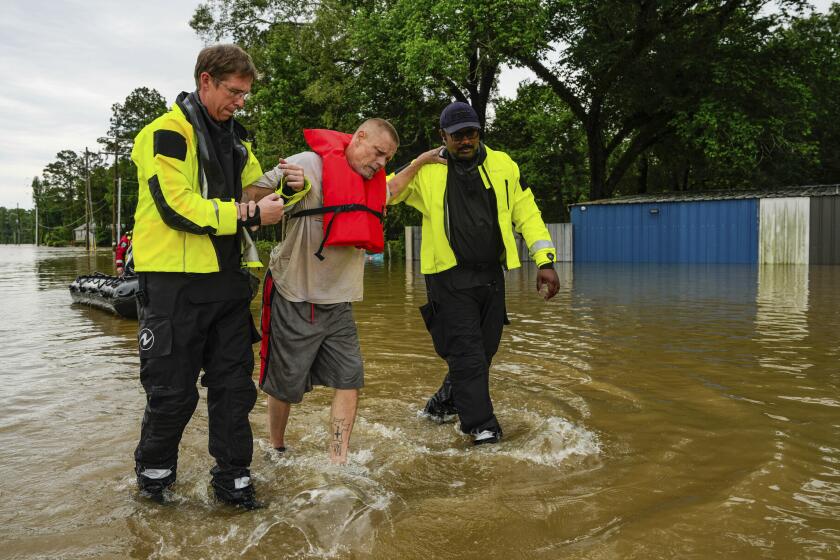‘Heat’ aims to fuel restraint
“Heat,” which premieres tonight on PBS, is a “Frontline” documentary examining the scientific, social and political forces that have resulted in global warming.
Thorough and wide-ranging, “Heat” takes us from India’s cement factories (did you know cement manufacturing is the No. 3 contributor to carbon dioxide emissions?) and the U.N. Climate Change Conference in Bali to the international empire that is Exxon and the chambers of the Congress.
Not surprisingly, there are times during “Heat’s” two very solid hours when a viewer, particularly an American viewer, would be forgiven a whimper or two of despair. The problem seems so enormous. The glaciers are melting, the oceans are dying, the ice caps could be gone in a matter of decades. Drought and wild fires threaten the world, while people continue to denude carbon-fighting rain forests.
Yes, you may have bought a Prius and installed those energy-saving light bulbs, but it ain’t helping much. Because your neighbor’s still driving that Hummer and the American economy is built on the notion of cheap and plentiful petroleum products with, until recently, little or no thought to what that meant to the planet.
Meanwhile, by exporting the American dream of livin’ large to developing nations, we’ve only internationalized the problem.
“The Western model of growth is inherently toxic,” proclaims Delhi-based environmental activist Sunita Narain. “It’s highly capital intensive, highly resource intensive, it uses a lot of materials, uses a lot of energy and generates a lot of waste. If every Indian was to live like an American, then the planet is doomed.”
It’s enough to make a person turn off all the lights, pull the covers over her head and weep. But that, of course, is the problem. This is exactly what Americans have done for far too long. Or at least this is what “Heat” argues, and it does so quite persuasively.
We as a nation have sat back on our haunches for too long, buying our SUVs and deriding Europeans for not having air conditioning in every building, content to let a surprisingly wide range of special interests -- the Texas oilman and the Detroit car manufacturer, yes, but also the Iowa corn farmer and the anti-nukes environmentalists -- dictate what has passed for an energy policy.
This is simply infuriating, which is clearly what writer-director Martin Smith had in mind. Because after making the necessary arguments that the problem is real, dire and international, Smith turns his attention to his homeland. The hook for “Heat” is that, at long last, American businesses are taking the environment seriously.
But this is far from a problem-solved program, and no one gets off easily. Not the car manufacturers who cut a deal with the Clinton administration to provide hybrids but turned out SUVs instead (allowing Honda and Toyota to corner the market). Not the oil companies that publicly declare they are funding alternative energy research while devoting less than one-tenth of 1% of their billions of dollars in annual profits on it.
Not the generations of politicians that have willfully ignored the model set by European countries, refusing to impose regulatory taxes or unpopular laws in an effort to curtail energy use.
Perhaps the most chilling moment in “Heat” comes when Sen. John W. Warner (R-Va.) is asked why Congress is paying more attention to the business leaders than the legions of scientists who have been warning of climate change for years. “There’s real money in that group,” he says matter-of-factly.
Not even the current major-party presidential candidates come away unscathed, both of whom have flip-flopped on issues including ethanol and off-shore drilling.
By the end of the two hours, your stomach may still hurt and you may find yourself making a list of the things you can do to decrease your carbon footprint. (Hint: Using ethanol apparently isn’t one of them -- it takes lots of petroleum to grow that corn.)
But more important, you will find yourself wondering how best to pressure larger institutions -- namely, corporations and government -- into finally putting away their old profit-driven, lobbyist-controlled ways and becoming world leaders again. Before it’s too late.
--
McNamara is a Times staff writer.
--
‘Frontline: Heat’
Where: KCET
When: 9 tonight
Rating: Not rated
More to Read
Start your day right
Sign up for Essential California for news, features and recommendations from the L.A. Times and beyond in your inbox six days a week.
You may occasionally receive promotional content from the Los Angeles Times.







